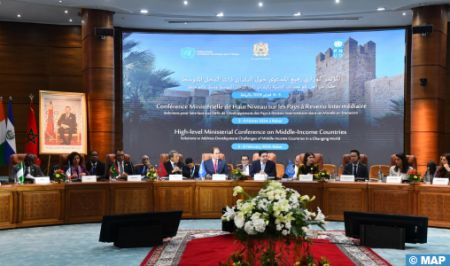Rabat Conference on MICs Urges Paradigm Shift in International Cooperation for Sustainable Development
Countries participating in the High-Level Ministerial Conference on Middle-Income Countries (MICs), which concluded here Tuesday, called for a paradigm shift in international cooperation for sustainable development. “The participants stressed the need for a paradigm shift in international cooperation to promote fair, inclusive and just transitions towards sustainable development”, according to the final declaration of the international conference. They commended the initiative of the Kingdom of Morocco, as Chair of the Group of Like-Minded Countries Supporters of MICs, for hosting this Ministerial Conference in collaboration with UNECA and the United Nations Development Programme (UNDP), aiming to provide robust political impetus to promote international development cooperation with and among middle-income countries. The participating countries reaffirmed their commitment to advancing their collective interests and finding practical, innovative and effective solutions to the specific challenges encountered by MICs on the path to sustainable development. They underscored the significance of South-South and triangular cooperation in addressing their development needs, particularly through capacity building, fostering peer-learning and sharing best practices among MICs across regions. In this context, they recalled that the 2030 Agenda for Sustainable Development acknowledges that MICs continue to face significant hurdles in achieving sustainable development. To sustain the progress achieved thus far, efforts to surmount current challenges should be intensified through experience-sharing, enhanced coordination and targeted support from the UN development system, international financial institutions, regional organizations, and other stakeholders. The participating countries urged the United Nations development system to devise a comprehensive system-wide inter-agency action plan to better tackle the multifaceted nature of sustainable development. They also called for promoting cooperation for sustainable development and providing concerted and inclusive support to MICs, considering their specific challenges and diverse needs. To this end, they committed to crafting a Strategic Action Plan for MICs for the period 2025-2030 through consultations in collaboration with the United Nations development system, development partners and stakeholders. They welcomed the proposal from the Philippines to host an international conference in support of this process by the end of the year. While the term “middle-income country” categorizes nations based solely on per capita income, it fails to capture the diverse realities of these countries and oversimplifies their complex situations. Hence, participants emphasized the critical necessity for a more comprehensive development cooperation system, incorporating the transitional development approach. This approach acknowledges that development is a multidimensional, progressive and ongoing process that extends beyond reaching a specific income threshold. Moreover, they pledged to foster dialogue, coordination and cooperation to champion and amplify the interests of MICs and support them in surmounting their unique obstacles on the path to sustainable development across economic, social and environmental dimensions. The participants also committed to strengthening the “Like-Minded Group Supporters of Middle-Income Countries” as an official intergovernmental forum for dialogue, advocacy and coordination on priority development issues related to international development cooperation and global governance. This group is tasked with reinforcing solidarity and cooperation among and with MICs. They also undertook to monitor the implementation of the final declaration during the eightieth session of the United Nations General Assembly.

